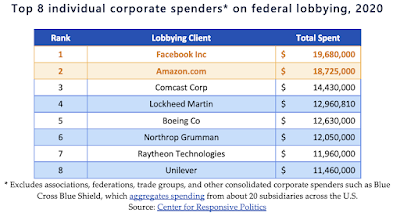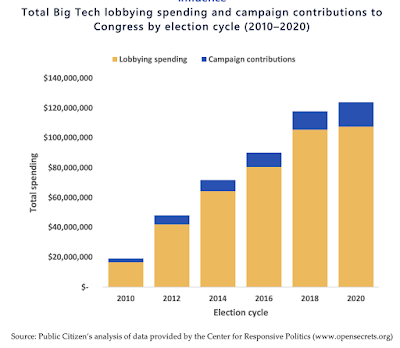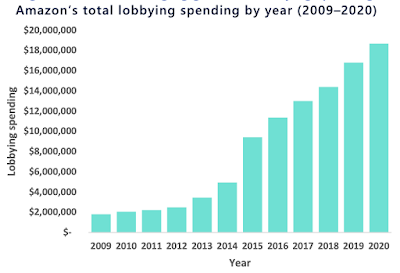As I have said before, Washington is for sale and Corporate America has proven itself quite willing to buy politicians at just about any cost. A recent study by Public Citizen, a "nonprofit consumer advocacy organization that champions the public interest in the halls of power" examines two of the largest lobbyists in the hallowed halls of the nation's capital as shown here:
This report is particularly pertinent given the growing power of the technology sector with its near monopoly on social media outlets and the current political and health (i.e. COVID-19) narrative and, in the case of Amazon, its growing presence as the world's retailer.
The authors of the study used data provided by the Center for Responsive Politics (i.e. Open Secrets) to analyze how Big Tech has "blanketed Capitol Hill with lobbyists and lavished members of Congress with campaign contributions", in other words, buying influence in Washington that far outstrips the meagre to basically nonexistent influence that voters have on lawmakers....other than casting their vote.
Let's look at a bit of history. Back in 2010, when associations, federations, trade groups and other consolidated corporate spenders are excluded, there was not a single big technology company represented among the top eight lobbyists unless you include Verizon Communications. In 2017, Google (Alphabet Inc.) rocketed to the top of the list and was the only technology sector representative followed by the usual defense sector players. In 2020, this changed substantially as shown on this table:
Here is another table showing how much each of these corporations spent on lobbying in 2020:
Here is a graphic that looks back in time at the growth in lobbying expenditures for both Facebook and Amazon compared to two of the more influential members of Corporate America in the past:
Now, let's look at overall spending by Big Tech on both lobbying and campaign contributions going back to 2010:
During the 2020 election cycle, Big Tech spent 5.2 percent more on lobbying and campaign contributions than it did during the 2018 cycle, hitting a total of $108 million in lobbying 2020.
Let's look at the two biggest technology sector lobbyists and how their spending on lobbying has grown over the past decade:
1.) Amazon:
2.) Facebook:
There is an upside; all of this lobbying creates jobs for one sector of the economy, lobbyists as follows (for 2020):
1.) Amazon - 117 lobbyists
2.) Google - 97 lobbyists
3.) Facebook - 71 lobbyists
4.) Apple - 48 lobbyists
In 2020, the biggest tech sector behemoths retained the services of 333 lobbyists, up from less than 100 a decade earlier. It is also important to note that half of the top ten lobbyists who contributed amounts ranging from a paltry $324,258 to a more substantial $571,744 just happened to be lobbyists representing Big Tech in 2020 as shown here:
Big Tech also shelled out $3.2 million in campaign funds for representatives on four key Congressional committees that hold jurisdiction over antitrust and privacy legislation including the House Judiciary Committee, the House Energy and Commerce Committee, the Senate Committee on the Judiciary and the Senate Committee on Commerce, Science and Transportation as shown here:
In general, more of the funds went to Democratic members of these Congressional committees with $1.678 million going to the Democratic members and $1.409 million going to the Republican members.
Given the dominance of the American technology sector oligopoly, it is not terribly surprising that Big Tech and its lobbyists are willing to throw around tens of millions of dollars to ensure that Washington sees things its way. Let's close with this quote from the paper's conclusion:
"Big Tech’s increasingly dominant role in our economy and everyday lives is worsening social problems that need a political response. Yet as Big Tech converts its enormous economic and social power into political influence, our political system is hamstrung from addressing those increasingly serious issues. This problem is reflective both of Big Tech’s extraordinary wealth and power and a broken political system that works for giant corporations but not the rest of us. It is not susceptible to easy solutions.
As I said at the beginning of this posting, Washington is for sale and Corporate America, particularly the technology tyrants, are in a buying mood.














No comments:
Post a Comment